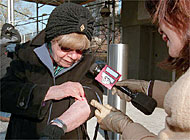Jewish groups back distribution plan for Holocaust survivors

Jewish groups have come out in support of a court-inspired distribution plan to share out money from Swiss banks among Holocaust survivors and their heirs. Their views became known at a court hearing in New York.
During the hearing, which started on Monday, Jewish groups and Holocaust survivors were given a chance to express their views on how a $1.25 billion (SFr2.2 billion) settlement should be divided up.
The payment was agreed with Switzerland’s two biggest banks, UBS and Credit Suisse, over two years ago, to settle the issue of Holocaust era assets in Swiss banks.
The court heard criticisms from many Holocaust survivors, some of whom objected to the length of time it has taken for a distribution plan to be approved.
Others took issue with the nature of the proposed plan, which was drawn up by a court-appointed mediator, Judah Gribetz. The plan is currently being considered by US district court judge, Edward Korman.
However, Jewish groups supported Gribetz’s proposals. Claims Conference, which will be distributing money to Holocaust survivors in eastern Europe, said in a statement: “We believe this allocation plan is the quickest way to bring a measure of justice to as many people as possible.”
Elan Steinberg, executive director of the World Jewish Congress, also endorsed the plan, saying the money would not go to organisations, but would benefit holders of dormant accounts in Swiss banks and needy Holocaust survivors.
“The judge made it very clear… no monies are going to organisations… They are either going to the direct benefit of Swiss bank depositors or they are going to be distributed with the intention of aiding needy Holocaust survivors through social welfare agencies.”
Gribetz’s plan has earmarked $800 million for claimants who can prove that their families deposited money in Swiss banks during the Nazi era, and never got it back. An estimated 80,000 people have identified themselves as depositors, or heirs of account holders.
Gribetz envisages sharing most of the remaining funds among wartime refugees who were turned away at the Swiss border or expelled from Switzerland and former slave labourers forced to work for Swiss-owned companies.
He has estimated that each refugee would receive around $2,500 and each forced labour about $1,000. However, he has already warned potential claimants that “there is simply not enough money available” to pay all the victims and their heirs.
He has also earmarked $100 million to compensate victims whose assets were stolen by the Nazis and sent to Switzerland. But he recommended that the money be used to pay for food, medical care and housing for “the neediest Nazi victims”, because it would be too difficult and time-consuming to process individual claims.
Last July, the settlement was expanded to include Swiss firms, which had employed slave labourers during the Second World War. A number of Swiss companies took the opportunity to join the settlement in exchange for protection from future legal action.
Among those who contributed were the food giant, Nestlé, the healthcare multinational, Roche, as well as Swiss insurers accused of failing to honour life insurance policies.
swissinfo with agencies

In compliance with the JTI standards
More: SWI swissinfo.ch certified by the Journalism Trust Initiative
You can find an overview of ongoing debates with our journalists here . Please join us!
If you want to start a conversation about a topic raised in this article or want to report factual errors, email us at english@swissinfo.ch.